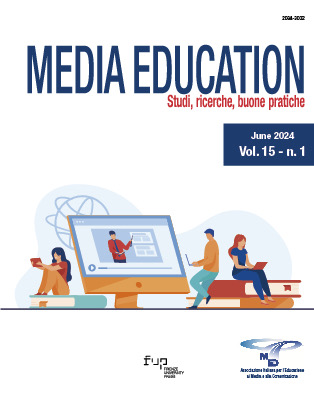Un progetto per promuovere la competenza digitale nella scuola: Patentino per cittadini digitali
Published 2024-06-12
Keywords
- digital competence,
- driving licence,
- school project,
- digital citizenship,
- ICT
Copyright (c) 2024 Maria Rosaria Fiorelli , Francesco Mezzanotte; Floriana Falcinelli , Lisa Baldella ; Caterina Lombardi

This work is licensed under a Creative Commons Attribution 4.0 International License.
Abstract
This article presents the training course aimed at primary, first and second level secondary schools, carried out by teachers using a kit of materials prepared by experts and designed for each individual school level entitled: License for digital citizens. The initiative aims to attract younger people from the age group in which we know independent use of the internet is widespread (9-15 years). Promoted and coordinated by the USR for Umbria in collaboration with EFT Umbra and Corecom Umbria, it is implemented and managed by a stable working group. The logic of the project aims at prevention through the training and awareness of multiple social actors, rather than intervening in the face of emergencies.
References
- Clifford, I., Kluzer, S., Troia, S., Jakobsone, M. and Zandbergs, U.( 2020), DigCompSat, Vuorikari, R., Punie, Y., Castaño Muñoz, J., Centeno Mediavilla, I.C., O`keeffe, W. and Cabrera Giraldez, M. editor(s), Publications Office of the European Union, Luxembourg, 2020, JRC123226
- Federal Ministry Republic of Austria, Digital and Economic affairs , ( 2018) Digital Competence Framework for Austria. DigComp 2.2 At, : BMDW Vienna
- Floridi L.(2014), La quarta rivoluzione. Come l’infosfera sta trasformando il mondo, tr. it Raffaello Cortina Milano 2017
- Floridi L., ( 2022) Etica dell’intelligenza artificiale. Sviluppi, opportunità , sfide, Raffaello Cortina Editore, Milano
- Garavaglia A.,( 2015) Transmedia Education, Unicopli, Milano
- Kluzer, S., Centeno, C. and Okeeffe, W.( 2020), DigComp at Work, The EU’s digital competence framework in action on the labour market: a selection of case studies Publications Office of the European Union, Luxembourg
- Marinelli A. Ferri P., ( 2010) New media literacy e processi di apprendimento, Introduzione a H. Jenkins H , Culture partecipative e competenze digitali, Media education per il XXI secolo, Guerini Studio, Milano
- Panciroli C, Rivoltella P.C., ( 2023) Pedagogia algoritmica. Per una riflessione educativa sull’Intelligenza artificiale, Scholé, Brescia
- Parmigiani D, ( 2019) Progettazione di percorsi di Media Education, in Rivoltella P.C. , Rossi P.G. , a cura di, Tecnologie per l’educazione, Pearson, Milano 2019,pp 167-180
- Prensky M, ( 2013) La mente aumentata. Dai nativi digitali alla saggezza digitale, Erickson, Trento
- Ranieri M, (2019) Le competenze digitali per la formazione dei cittadini in Rivoltella P.C. , Rossi P.G., a cura di, Tecnologie per l’educazione, Pearson, Milano , pp 227-238
- Rivoltella P. C. ( 2017), Media Education. Idea , metodo e ricerca, La Scuola Brescia
- Vuorikari R., Kluzer S, Punie Y, ( 2022) DigComp 2.2. The Digital Competence Framework for citizens. with new examples, of kwnoledge, skills and attitude, Publications Office of the European Union, Luxembourg
- Vuorikari, R., Punie, Y. and Cabrera Giraldez, M ( 2020), Emerging technologies and the teaching profession, , Publications Office of the European Union, Luxembourg.

